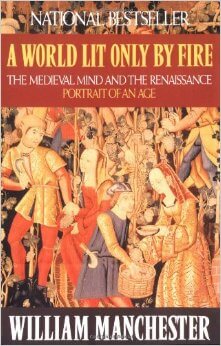“A World Lit Only By Fire” by William Manchester
William Manchester stands as one of the 20th century’s most renowned authors and biographers. His enduring biographies on Winston Churchill, Douglas MacArthur, and John F. Kennedy are moving reads, and absolutely captivating from start to finish. But it is one of Manchester’s lesser-known works, A World Lit Only By Fire, that might be his most fascinating.
A World Lit Only By Fire chronicles the Middle Ages, colorfully telling the story of Western Civilization’s often overlooked thousand years. Manchester offers a popular, accessible work, acknowledging, “It is, after all, a slight work, with no scholarly pretensions. All the sources are secondary, and few are new; I have not mastered recent scholarship on the early sixteenth century.”[1]
Nonetheless, Manchester is a master storyteller, offering intriguing detail after intriguing detail, all the while situating his subplots within their broader cultural context. The collapse of the Roman Empire in the fifth century ushered in a 1000-year reign of chaos, barbarism, and decadence. With civilization unraveled, Manchester notes, “It says much about the Middle Ages that in the year 1500, after a thousand years of neglect, the roads built by the Romans were still the best on the continent.”[2]
One cannot read A World Lit Only By Fire without seeing similarities between the Medieval Era and the modern turmoil in the Middle East. Manchester’s work brings into stark relief the barbarism fomented by radical Islam. Christian Civilization, and all of its variegated pieces, is indeed a superior one.
Additionally, he covers the Age of Exploration, with special attention given to Magellan and his circumnavigation of the globe. Manchester tells of explorers sailing into uncharted territory, embarking on harrowing journey after harrowing journey, and literally proving the world was round.
Manchester, though not writing as a churchman, vividly (at times too vividly) describes medieval decadence inside and outside of the church. Manchester details the unimaginable abuse, debauchery, and perversion that often marked the Roman Catholic Church. This corruption reached its zenith through the infamous Borgia family. Indeed, depravity ran amuck, and the church was begging for Reformation.
Manchester reflects on the dramatic change the sixteenth century would experience, including, but not limited too, the Protestant Reformation,
The mighty storm was swiftly approaching, but Europeans were not only unaware of it; they were convinced that such a phenomenon could not exist. Shackled in ignorance, disciplined by fear, and sheathed in superstition, they trudged in the sixteenth century in the clumsy, hunched pigeon-toad gait of rickets victims, their vacant faces, pocked by smallpox, turned blindly toward the future they thought they knew—gullible, pitiful innocents who were about to be swept up in the most powerful, incomprehensible, irresistible vortex since Alaric had led his Visigoths and Huns across the Alps, fallen on Rome, and extinguished the lamps of learning a thousand years before.[3]
Though A World Lit Only By Fire is not styled as church history, any assessment of the Medieval Era is largely a history of the church. And A World Lit Only By Fire reminds me anew of Christ’s pronouncement to build his church and how inexorably true his promise remains. Manchester recounts scandalous popes, corrupt Curia, tribal superstitions, and countless other indicators of a world engulfed in spiritual, moral and intellectual darkness.
Indeed, as Manchester observed, “Christianity survived despite medieval Christians, not because of them. Fail to grasp that, and you will never understand their millennium.”[4] Of course, evangelical Christians understand that is the narrative of every generation, not just the more corrupt ones. Our Great Commission effort does not prop up Christ’s promise to build his church; Christ’s promise to build his church props up our Great Commission efforts.
Arguably, Manchester’s magisterial three-volume biography of Sir Winston Churchill, The Last Lion, is his greatest work of all. Tragically, the author died before completing the third volume, leaving Paul Reid to finish the trilogy.
During Manchester’s physical maladies he suspended his work on The Last Lion and undertook what he reckoned to be the less arduous A World Lit Only By Fire. It was something of a distraction for Manchester, who was convalescing in Florida, far from his Churchill materials.
As a Churchill admirer, I wish he’d been able to finish The Last Lion, even at the expense of A World Lit Only By Fire. At the same time, A World Lit Only By Fire makes a unique contribution in its own right, offering detailed attention and keen analysis of the forgotten millennia.
[1] XIIV
[2] 5.
[3] 27.
[4] XVII.
topicsBook Reviews

February 04, 2016 at 11:04 pm, Milton Ferguson said:
President Allen,
Thanks for your superb column on Wm. Manchester’s “A World Lit Only By Fire”. I’ve enjoyed his biographies and I’m eager to read this work.